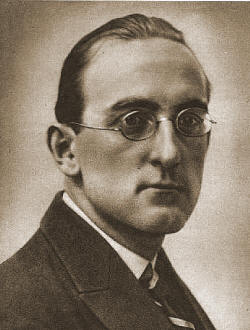

Queer Places:
Ołówkowa 14, 05-800 Pruszków, Poland
The Hudson New York, 356 W 58th St, New York, NY 10019
Forest Cemetery, Brzozowa, Laski, 05-080 Izabelin, Poland
 Leszek Józef Serafinowicz (pen name: Jan Lechoń; 13 March
1899 in Warsaw,
Congress Poland,
Russian Empire – 8 June 1956 in
New York City) was a Polish
poet, literary
and theater critic, diplomat, and co-founder of the
Skamander
literary movement and the
Polish Institute of Arts and Sciences of America.
Leszek Józef Serafinowicz (pen name: Jan Lechoń; 13 March
1899 in Warsaw,
Congress Poland,
Russian Empire – 8 June 1956 in
New York City) was a Polish
poet, literary
and theater critic, diplomat, and co-founder of the
Skamander
literary movement and the
Polish Institute of Arts and Sciences of America.
Lechoń studied the Polish language and literature at the University of Warsaw, by which point he had already authored two collections of poetry and a play. He was co-editor of Pro arte et studio magazine. Lechoń created the name Skamander for that literary group and delivered the opening speech at the group's first meeting on 6 December 1919. During the Polish–Soviet War (1919–21), he worked in the press office of Chief of State Józef Piłsudski.
Lechoń was a member of the Pikador literary cabaret, a member of the Polish Writers' Union, and secretary-general of the PEN Club. In 1926–29 he edited the satirical magazine Cyrulik Warszawski ('The Barber of Warsaw'—named in reference to The Barber of Seville). In 1925 he received an award from the Polish Book Publishers' Association, and in 1935 an award from the Polish Academy of Literature.[1][2]
In 1921 he attempted suicide and spent some time in hospitals or sanatoriums trying to overcome depression. A troubled homosexual affair influenced Lechoń's decision to abandon Warsaw.[3] From 1930 to 1939 he was a cultural attaché at the Polish embassy in Paris. After the fall of France to Nazi Germany, he left for Brazil and later settled in New York City. There he co-edited many Polish newspapers and magazines; in 1942 he co-founded the Polish Institute of Arts and Sciences of America.
On the suggestion of a psychiatrist, Lechoń started writing a diary (1949–56). Amid recondite autobiographical reminiscences, the diary also documents Lechoń's attempts to come to terms with his homosexuality. "Oppressed by a sense of émigré obsolescence and poetic sterility, unable to resolve the conflict between his programmatically traditionalist Polish public persona and the anxieties of an aging, impecunious homosexual in an America beset by McCarthyism ...",[4] Lechoń committed suicide on 8 June 1956 by jumping from the twelfth floor of the Hudson Hotel. At the time, his motive for doing so was given as depression deepened by "social degradation". The memoirs of Adam Ciołkosz point also to depression caused by the strengthening of the communist regime in Poland.
In 1991 Lechoń's remains were exhumed from Calvary Cemetery in Queens and transferred to a cemetery in Laski, to a family tomb shared with his parents, Władysław and Maria Serafinowicz.
My published books: